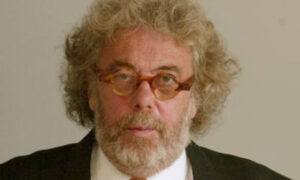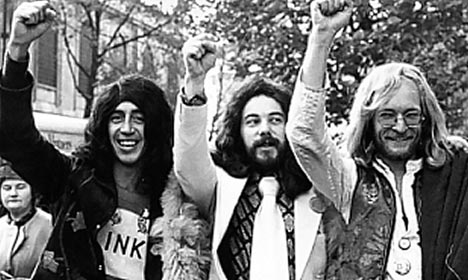
The Column of Lasting Insignificance: October 9, 2010
John Wilcock
“The Republican base is part of a conservative movement. The Democratic base, by contrast, is a loose coalition that elects a new president and then goes home, expecting the new president to deliver miracles.”
— Robert B. Reich in The American Prospect
THE DATE OF THIS COLUMN happens to be the same day that multi-millionaire publisher Felix Dennis will be reading his poetry at a provocatively-named dance center, The Firkin Crane, in Cork, Ireland, and you might wonder what anybody as rich as Felix, with homes in London, New York, Connecticut, and Mustique, is doing there. That’s because you don’t know Felix. (A firkin, btw, is a nine-gallon barrel and a crane is what it used to be weighed on).
One of Britain’s richest multimillionaires, he’s been described as “the enfant terrible of magazine publishing….eccentric…. entrepreneurial but unconventional” and has proved his business ability with successful publishing houses on both sides of the Atlantic. But it’s his role as a poet that seems to have surprised people the most.
 A best-selling poet? Surely that’s an oxymoron, yet Dennis has published six best-selling collections, has appeared onstage with members of the Royal Shakespeare Company in Stratford, and is currently midway through his sixth reading tour. Novelist Tom Wolfe, calling Dennis “a twenty-first century Kipling,” says that his poetry “rollicks and rolls with rhyme, meter, and melody.”
A best-selling poet? Surely that’s an oxymoron, yet Dennis has published six best-selling collections, has appeared onstage with members of the Royal Shakespeare Company in Stratford, and is currently midway through his sixth reading tour. Novelist Tom Wolfe, calling Dennis “a twenty-first century Kipling,” says that his poetry “rollicks and rolls with rhyme, meter, and melody.”
____________________________________
I’ve sailed the ship, I’ve owned the line,
I’ve swilled on bilge and drunk fine wine,
I’ve paced the bloody jetty, too,
Not knowing how I’d pay the crew.
I’ve sailed at dawn without a plan,
Faced mutiny and ‘ung a man,
(‘ung more than one, if truth be told);
I’ve stacked the decks with blood and gold
Paid out upon the barrel-head
(With widows and their orphans fed
Most scrupulous, ‘cash money down’ –
I’m quite the thing in Portsmouth Town).
____________________________________
One critic commented that Felix Dennis was “cheerfully irreverent” about his past, laughing at the youthful convictions of himself and his “clappy-happy” friends in his collection, The Summer of Love.
“We were very certain, we were very sure/ We were very righteous, (and we were very poor).” Dennis rhymed.
My personal recollections were of Dennis the summer of 1971 when he and his partners, the Aussies Richard Neville, Jim Anderson, and Martin Sharpe, faced trial at London’s august Old Bailey, for producing a magazine deemed to be obscene and likely to corrupt the minds of children. The irony being that it was children who had prepared the entire ‘Schoolkids Issue’ while the trio was on vacation out of the country.
The ridiculously serious judge, wearing the wig and dress-like robe characteristic of the British legal system, rendered a guilty verdict so over the top that it was eventually reversed, but not before he’d maliciously singled out Dennis as somehow mentally inferior to the other two.
At the trial, Neville maintained that the relevant law was archaic and irresponsible. “The very offence of ‘corrupting public morals’,” he argued, “rests on the assumption that there is one all-embracing moral code to which all classes of the community subscribe, and that this is so weak, so unstable, that a single publication can bring it into jeopardy….It is the prosecution which corrupts public morality by seeking to rob us of our freedom of speech.”
Despite support from numerous cultural and literary defense witnesses, the trio were found guilty and — certainly not to our surprise, for Amber and I attended the trial — the “straight” press by and large backed the verdict. Some individuals, however, were outraged. Sociologist Michael Schofield pointed out that it was not only the OZ trio that had been on trial but thousands of young people. “They have convicted a whole generation,” he said, an opinion echoed by Time Out‘s David May who opined that this single act had polarized a generation. David Hockney said: “I just think it’s terrible. I now believe, whereas I never did in the past, that there is an attack on a certain kind of culture. The vindictiveness of the judge is just disgusting.”
 Richard Neville, Dennis, Jim Anderson in 1970
Richard Neville, Dennis, Jim Anderson in 1970
[In the still-unreleased movie, Hippie Hippie Shake (from Richard Neville’s book about the Oz era) Dennis is portrayed by actor Chris O’Dowd who recalls him as ”an incredibly charismatic man”.]
Following acquittal by the Court of Appeal, Dennis founded a monthly magazine about Kung Fu aided by the rising popularity of martial artist Bruce Lee. Then, quick to see the cyber future, he set up Personal Computer World and MacUser both of which he sold in the mid-eighties. He also co-founded a $2bn computer mail order company, which eventually went public on the NASDAQ and formed the bulk of his personal wealth.
Next came the publishing house which begat the men’s magazine, Maxim, and a newsmagazine The Week, which succinctly covered the world in a manner once presented by Time and Newsweek. Except shorter and better. Eventually both magazines took root this side of the Atlantic and the English edition of The Week is superior to the U.S. one because Brits are more interested in the rest of the world than most insular American readers.
By the beginning of this century, Dennis’ fortune was estimated at more than a billion dollars, and the ex-hippy began to devote four hours a day to writing poetry and the remaining time to a new hobby: planting trees. many of them at his expansive estate in Warwickshire — one of his five homes — which he calls The Forest of Dennis.
“I’ve been busy for years, buying land, often under pseudonyms, and planting trees on it. All the money is going into it when I die… and in the end I’d like to think that it will be 20 to 30,000 acres,” he says, adding: “It’s very difficult to be continuously charitable in a capitalistic society. You’ve also got to make sure that you can pay everyone who works for you.”
![]()
Prostitution could be a solution to Nevada’s budget problems according to George Flint, 76, lobbyist in Carson City for the state’s brothel owners. His suggestion is the imposition of a $5 entrance fee tax on visitors to the houses of ill repute, most of which unfortunately are two hours drive from Las Vegas, whereas most of the potential customers are in Sin City itself (where prostitution, ironically, is illegal). Reporting this dilemma, the Nation says Nevada is scrambling to deal with a budget shortfall of $3.4bn over the next two years with tax increases probably the only answer. “Since the bursting of the housing bubble,” the mag adds, “Nevada has been a basket case” with unemployment now above 14% and more than one in ten receiving food stamps.
THE DEEPER YOU DRILL the hotter it gets which is the principle behind Australia’s Geodynamics company which is going down as far as 15,000 feet with scores of holes in that country’s Cooper Basin, a desert region.
The next phase is to carefully pump water down and tap the resulting steam to drive turbines and generate electricity. “The beauty of the concept is that if it works it can work anywhere in the world,” says Subir Sanyal, president of California’s GeoThermEx. Conservative estimates suggest that a small percentage of the tapped energy could provide all of America’s needs, says the Economist, adding however that there are “technical and economic hurdles to overcome.”
THE WILCOCK WEB: Now that we’re paying the Taliban in southern Afghanistan not to attack us, why not withdraw our troops and just send them the money?…. With consumption rising by 10% a year, China has become the world’s biggest beer drinker…. Mcdonald’s will be adding porridge to its menu next year…. Cougar, defined as “an older woman seeking a sexual relationship with a younger man,” has just made it into the new edition of the Oxford American Dictionary….. Twenty-six years on Death Row and they just happen to run out of chemicals the week of his execution? They never used to run out of rope, bullets, or electricity….And isn’t ‘cruel’ a better description of murder than of execution for same?…. Almost 20,000 murders in Venezuela last year helped Caracas become the world’s most dangerous city…. Anheuser-Busch, said to be worried about declining sales for Budweiser, is changing ad agencies. It would make more sense for them to copy the recipe of Prague’s highly superior original Budweiser….“The importance of a recognizable brand to sell a region can’t be under-estimated,” declared Ivo Mokovich as he announced the village’s forthcoming testicle-cooking contest….. Try swapping captions on those pointless New Yorker cartoons: you’ll find they work just as well…Why are investors like the California supermarket tycoon Ronald Burkle admired for trying to take over other people’s companies?….. Offering their own version of anchor babies are the Chinese women who cross into Hong Kong to give birth becoming eligible for inexpensive health care and free education for 12 years…“I predict that banks will never pay interest on savings again,” writes Florence King in National Review, “and as soon as they get us resigned to that, they will start charging us a fee to keep our money for us”… Japan’s annual Foresight Survey predicts that television will offer tastes and smells by 2028; commercial flights will be on autopilot by 2035; and in 2037, seismologists will be able to predict earthquakes a year in advance….. MISFORTUNE COOKIES: A fool always finds a greater fool to admire him… Estimating that there is $30billion worth of value lying around on partly or completely unused gift cards, Plastic Jungle in San Jose, CA, was set up for users to sell, swap or donate them…“A nation should be just as full of conflict as it can contain.” — Robert Frost (1864-1973)
